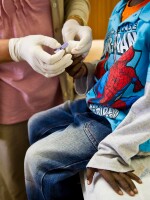The news for patients who had injections of fungus-tainted steroids just keeps getting worse.
Now doctors are reporting two new spinal conditions among patients successfully treated for meningitis, a brain infection. One involves epidural abscesses, pus-filled sacs of fluid around the spine. A more serious condition is arachnoiditis — inflammation of tissue around the nerve roots coming out of the spine.
The Centers for Disease Control and Prevention doesn't yet have a good handle on the number of these new complications, but there appear to be dozens so far.
Most have been in Michigan and Tennessee, which together make up nearly half the 404 cases of fungal infections reported so far in 19 states. (Twenty-nine people have died.) But cases of spinal infections have recently been seen in Virginia and Indiana, too.
"What we're hearing is that patients have been treated for meningitis and improved. Then they returned with these complications," Dr. Tom Chiller of CDC told Shots. "We don't have a good understanding of why certain people are developing these conditions."
He says patients with these complications don't seem to be older or more immunocompromised, "so we're not able to predict who's going to develop this."
The New York Times reports that about a third of 53 meningitis patients treated at St. Joseph Mercy Hospital in Ann Arbor, Mich., have developed epidural abscesses. Another 34 have had abscesses without prior meningitis.
Chiller says the situation is "an unprecedented event," so doctors and public health experts are learning how to cope with it as they go along.
The new problem affects different layers of tissue that encase the spine. The dura mater is the outermost layer. Next is the arachnoid, a delicate cobwebby membrane that carries much of the spinal cord's blood supply.
Of the two complications, epidural (meaning on or around the dura) abscesses are less dangerous and more amenable to treatment. If antifungal medication doesn't do the job, neurosurgeons can often debride or remove the infected tissue and drain the infection.
Arachnoiditis is much more difficult to treat. Delicate nerve roots are caught in a thick, fibrous material that compresses them, causing intense pain, numbness, paralysis, pins-and-needles sensations, sometimes loss of bladder control and other neurologic symptoms.
Surgery is not usually an option, if ever, and the success of drug therapy is uncertain. Chiller says experts don't think it's a good idea to infuse antifungal drugs directly into the spine because they can increase inflammation and make matters worse.
Patients who develop these spinal complications may need to be on antifungal medication, often intravenously, for six months to a year, Chiller says.
The trickiest problem for doctors is diagnosing epidural abscesses or arachnoiditis, because many of the patients exposed to the mold-contaminated steroids already have chronic back pain.
"That's why they were getting injections, right?" Chiller says. "So the real challenge is identifying whether the pain over the site of injection or where they have chronic pain is worse ... or is different."
There's no telling how many patients will develop the spinal complications. One indication is that so far most of the known victims previously had meningitis.
That appears to limit the risk largely to the 400 or so reported meningitis cases — and the others expected to be discovered in the coming weeks.
"We think the last of these products were given around Oct. 1, so we're already a month out from that," Chiller says. "We've passed the peak of the mean incubation period — the period between injection and onset of symptoms — which is around 20 days."
Other meningitis cases will be reported, he says, but they should begin to taper off quickly this month.
An estimated 14,000 Americans received injections of the mold-contaminated steroid made by New England Compounding Center, a Massachusetts company that has been shut down. Federal inspectors have found fungal and bacteria contamination in many samples of drugs made by the Massachusetts company.
A federal criminal investigation is under way, and a number of civil suits have already been filed.
Copyright 2020 NPR. To see more, visit https://www.npr.org.


